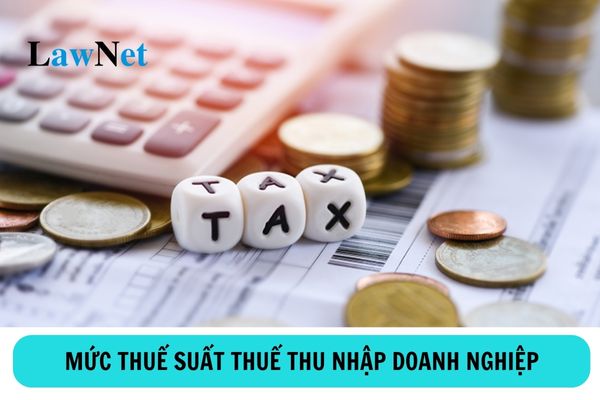What are regulations on corporate income tax rates in Vietnam?
What are regulations on corporate income tax rates in Vietnam?
According to the provisions of Article 10 of the 2008 Law on Corporate Income Tax amended and supplemented by Clause 6, Article 1 of the 2013 Law on amendments to the Law on Corporate Income Tax which replaces the phrase in Clause 1, Article 67 of the 2022 Petroleum Law, the corporate income tax rates are stipulated as follows:
- The corporate income tax rate applied is 20% from January 1, 2016.
- Enterprises with annual total revenue not exceeding twenty billion VND apply a tax rate of 20%.
Revenue used as the basis for determining whether an enterprise is subject to the 20% tax rate in Clause 2, Article 10 of the 2008 Law on Corporate Income Tax is the revenue of the previous year.
- The corporate income tax rate for activities of searching, exploring, and exploiting oil, gas, and other rare and valuable natural resources in Vietnam ranges from 32% to 50% depending on each project and each business establishment.

What are regulations on corporate income tax rates in Vietnam? (Image from Internet)
What are corporate income tax calculation methods in Vietnam?
Based on Article 11 of Decree 218/2013/ND-CP amended by Clause 8, Article 1 of Decree 12/2015/ND-CP, the method of calculating corporate income tax is as follows:
- The corporate income tax payable during the tax period is equal to the taxable income multiplied (x) by the tax rate.
For Vietnamese enterprises investing abroad, transferring the income after paying corporate income tax abroad back to Vietnam, for countries that have signed a Double Taxation Avoidance Agreement, the provisions of the Agreement shall apply; for countries that have not signed a Double Taxation Avoidance Agreement, if the corporate income tax rate in the countries where the enterprise invests is lower than the corporate income tax rate calculated according to the 2008 Law on Corporate Income Tax of Vietnam, the difference shall be collected.
- The corporate income tax payable for real estate transfer is equal to the income from real estate transfer multiplied (x) by the tax rate of 22%; from January 1, 2016, this tax rate is 20%.
- For enterprises specified in Points c, d Clause 2, Article 2 of the 2008 Law on Corporate Income Tax, the corporate income tax payable is calculated as a percentage of the revenue from selling goods and services in Vietnam. Specifically:
+ Services: 5%, services for restaurant, hotel, and casino management: 10%; in cases where services are supplied together with goods, the goods are calculated at a rate of 1%; if the value of goods and services cannot be separated, the rate is 2%;
+ Supply and distribution of goods in Vietnam in the form of import-export on the spot or according to international trade terms (Incoterms) is 1%;
+ Royalties are 10%;
+ Aircraft leasing (including engines and accessories) and ship leasing are 2%;
+ Leasing of drilling rigs, machinery, equipment, and transportation means (except as regulated in Point d, Clause 3, Article 11 of Decree 218/2013/ND-CP) is 5%;
+ Loan interest is 5%;
+ Transfer of securities and reinsurance abroad is 0.1%;
+ Derivative financial services are 2%;
+ Construction, transportation and other activities are 2%.
- For oil and gas extraction activities which have revenue and cost accounting regulations in foreign currencies within the contract, the taxable income and payable tax are determined in foreign currencies.
- Public service units and other organizations not being enterprises established and operating under the Vietnamese law, have business activities in goods and services generating taxable corporate income; if these units account for revenue but cannot determine costs and income from business activities, they declare and pay corporate income tax calculated as a percentage of revenue from selling goods and services. Specifically:
+ For services (including deposit interest, loan interest): 5%. For education, medical, and performance activities, the tax rate specified at Point c, Clause 5, Article 11 of Decree 218/2013/ND-CP applies;
+ For trading activities: 1%;
+ For other activities: 2%.
What are regulations on the place of corporate income tax payment in Vietnam?
Based on Article 12 of Decree 218/2013/ND-CP, regulations on the place of corporate income tax payment are as follows:
- Enterprises pay tax at the locality where their headquarters are located. If an enterprise has a dependent accounting production facility in a province or city directly under central authority different from where the headquarters are located, the tax is calculated to be paid at the headquarters and where the production facility is located.
The corporate income tax calculated to be paid in the provinces or cities directly under central authority where the dependent accounting production facility is located is determined by the corporate income tax payable during the period multiplied (x) by the ratio of expenses incurred at the dependent accounting production facility to the total expenses of the enterprise.
The tax payment regulation specified in Clause 1, Article 12 of Decree 218/2013/ND-CP does not apply to construction works, project items, or dependent accounting construction facilities.
The division, management, and use of corporate income tax revenue are carried out in accordance with the 2015 State Budget Law.
- Dependent accounting units of whole-sector enterprises with income outside the main business activities pay tax at the province or city directly under central authority where such business activities take place.
- The Ministry of Finance provides guidance on the place of tax payment as stipulated in Article 12 of Decree 218/2013/ND-CP.

